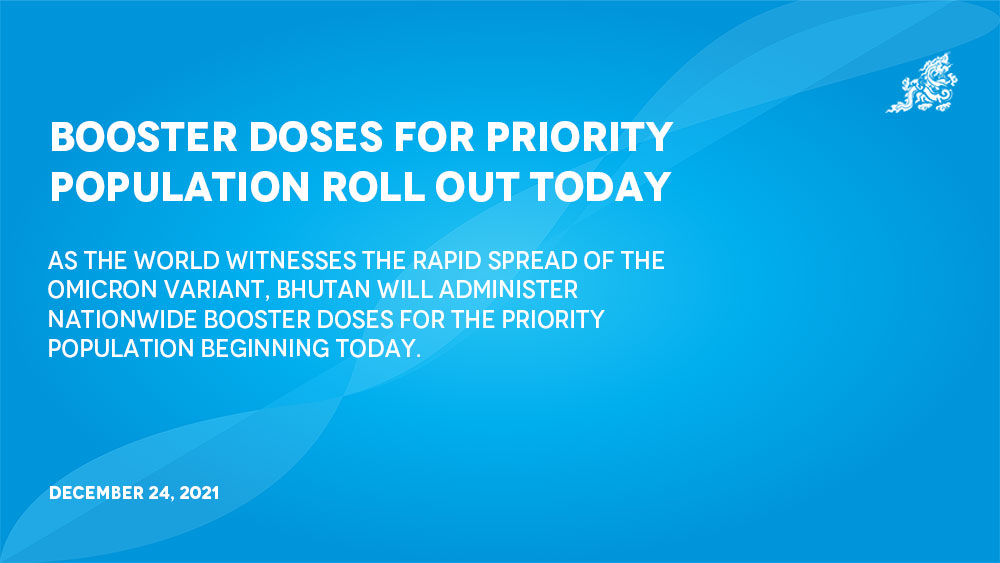Nima Wangdi
As the world witnesses the rapid spread of the Omicron variant, Bhutan will administer nationwide booster doses for the priority population beginning today.
Health Minister Dechen Wangmo said during a press conference yesterday that Omicron is highly infectious and the booster dose has been proven to provide higher protection against it.
“This is the reason that we have decided to roll out the booster dose for the priority population first,” the minister said.
Within a week, some 228,581 people in the priority population category are expected to be vaccinated.
Lyonpo said that the priority groups are adults who are 18 years and above residing in high-risk areas, those above 65 years, people above 18 and living with chronic medical conditions, health workers, and outbound travellers.
She said the booster reduces the severity of the virus and the transmissibility. “The rest of the population will be covered in the second rollout. We’re also planning to cover children of 5 to 11 years during the second round of booster roll-out as this group is the biggest concern of the ministry.”
Where to get the vaccines?
Ministry of Health (MoH) officials said that in the high-risk areas of Phuentsholing, Samtse, Sarpang and Samdrupjongkhar, different vaccination centres will be set up like during the first and second dose rollouts.
He said in these areas, centres are set up because there will be a huge booster-eligible group that the health facilities cannot cater to. “People should go to the nearest centres and get vaccinated.”
“In the rest of the dzongkhags, vaccines will be dispensed from health facilities like district hospitals and Basic Health Units,” he said.
“In Thimphu, the flu clinic will be open,” the official said.
Lyonpo Dechen urged eligible people to get boosted without delay since the rollout will only last for a week.
Mix and match
The head of the Royal Centre for Disease Control, Dr Sonam Wangchuk, said Pfizer and Moderna (mRNA) and AstraZeneca (Viral Vector) would be available for the booster dose.
“As we did for the second dose, mix and match is recommended even for the booster, given its higher efficacy,” Dr Sonam Wangchuk said. People will be given the choice of the vaccines.
“Moderna dosage will be reduced by half (0.25ml) compared to the second dose, while Pfizer and AstraZeneca dosages will remain the same at 0.3ml and 0.5ml respectively,” he said.
Why the second boost?
The press release from the MoH last week stated that the risk of confirmed coronavirus infection in those who have received boosters appears to be 11-fold less compared to those who have received only two doses.
According to some international news sources, the first and second doses are ineffective for the Omicron variant.
However, Dr Sonam Wangchuk said the first and second doses will provide a certain degree of immunity against the Omicron variant, but a booster can boost the immunity.
While many developed countries have rolled out booster doses to fight Omicron, Israel has announced even a fourth dose.
Bhutan has 263,010 doses of mRNA vaccine, out of which 159,570 doses are Pfizer expiring in March 2022, and 103,440 doses of Moderna (half doses) expiring in February 2022. “In addition, there are also 69,000 doses of Covishield expiring in March 2023.”
Bhutan rolled out its second Covid-19 vaccination dose on July 20, the distribution of which lasted for one week and a total of 77 percent of the overall population is fully vaccinated as of today.
Vaccine coverage so far
Lyonpo Dechen said the first dose coverage among people from 12-17 years stands at 99.7 percent while second dose coverage is 92.3 percent.
Overall coverage of the first dose for the eligible population above 12 years stands at 97.5 percent and 93.5 percent for the second dose.
Lyonpo said for the general age group, first dose coverage is 80.3 percent, while second dose coverage is 77 percent. “The vaccine coverage is amazing to date and now Bhutan is the first country rolling out boosters in the South-East Asia region.”
Omicron and its coverage
According to the scientists, this B.1.1.529 ‘Omicron’ variant is a newly identified strain of Coronavirus with 30 plus different mutations in the Covid-19 spike protein, which makes the process of its transmission easier.
Apparently, the variant also seems to be less affected by the available Covid-19 vaccines, which aggravates the threat, health experts say.
The effects and their impact are still being studied.
The variant is reported in 89 countries in the six World Health Organisation regions so far.
People are reminded to follow Covid-19 protection measures like wearing masks, avoiding crowds, handwashing, and maintaining social distancing.


